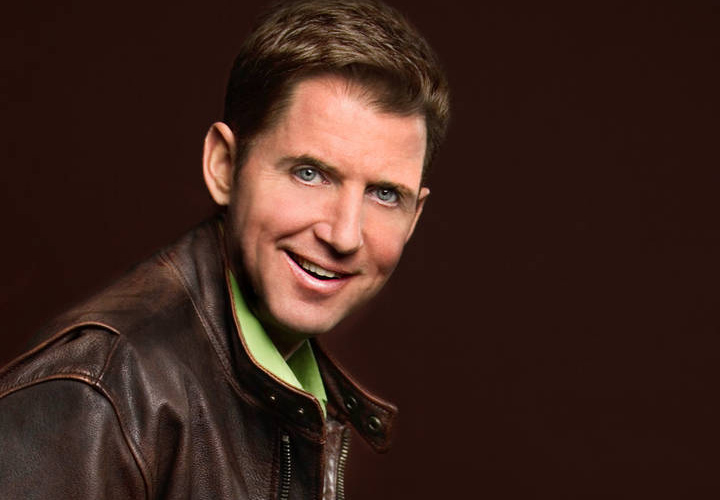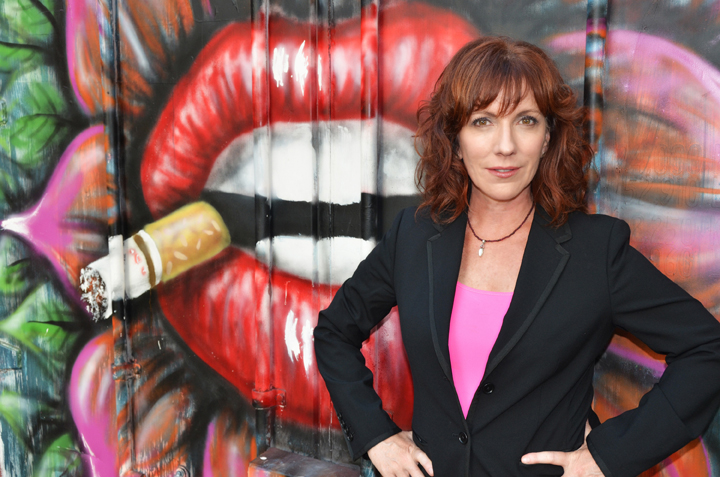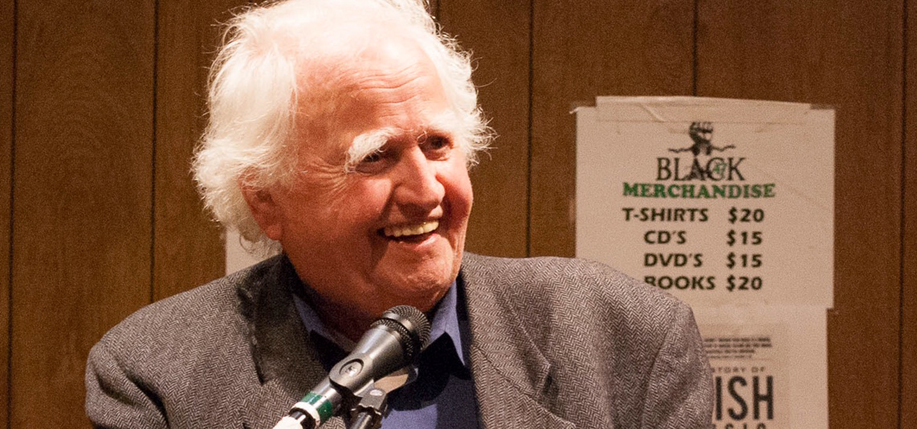Three comedic performers with Irish roots share how they get to the laughter. Is it the collective painful history as a people? The tendency not to take themselves too seriously? The influence of Irish hospitality? Or maybe they were just born that way. The larger-than-life Malachy McCourt, the sardonic Kevin Brennan, and the sophisticated, witty Maureen Langan shed some light on how they process life into material.
℘℘℘
Recently I had the pleasure of witnessing the talent of three Irish artists who are famous for being funny. According to the actor and writer Malachy McCourt and stand-up comedians Kevin Brennan and Maureen Langan, life provides endless material, and there’s always enough humor to go around. The tradition of Irish hospitality shines through in their ability to listen, take in life, and then use it in performance. Whether it’s a small crowd or a standing-room-only house, this comedic trio always leaves the audience wanting more. Here’s a glimpse of their personal perspectives on humor.
℘℘℘
Malachy McCourt is an actor with Limerick roots, an old-school storyteller (seanachie), radio personality notorious for his humorous rants on current events, and founding board member of Irish American Writers and Artists. He admits that he’s always been kind of a show-off, and that was his defense against despair and darkness. There is a certain equality in humor, as words are free and everyone is welcome to laugh. The kind of humor Malachy likes is when a powerless person triumphs over the established order.
“What appeals to me is the absurd and odd misuse of the language, absurdity of life, satire, wit as a weapon, less of joke telling, most of all storytelling. I’m too old to be crying so better to be laughing.”
He believes that tragedy is the great stimulus to humor. McCourt says, “The Irish mourn marriages and celebrate death. The most enjoyable times are at wakes. The Irish have such a marvelous time with the storytelling, the greatest laughs and the music, and the way they talk about the deceased. When they talk about a fella getting married they say ‘ah, poor old Tim is gone now.’”
An Irish penchant for irreverence magically changes the focus to something funny, lest we all be sitting around crying. Soon after I met with Malachy, he fractured his knee. He urged his concerned fans and friends not to send thoughts and prayers; instead, they should send large sums of money. He also told a hospital visitor that he hurt the knee kneeling down to pray too often. Devoted to his craft, he snuck out of the rehab facility for a day to work on a film.
So much of the humor he grew up with was connected with death, the next world, the pearly gates to heaven, and the characters who gain access or are sent to hell. He relayed a story from a radio interview that showed laughter to be a life-or-death situation.
“I was doing a thing one night on the radio, talking about death, and an Irish woman called in who said that she got in difficulties swimming and she essentially drowned according to what she was told, but they got her on land and they were giving her CPR. While she was unconscious, she said she was walking across a meadow and she met her father who had died a couple years before. She said to him, ‘You promised Mom that you would come back and let her know where you were and if you were alright.’ He said, ‘Yeah I know,’ and she said, ‘Why didn’t you?’ and he said, ‘Let her drop dead and find out for herself.’ She said she started laughing and she spurted out the water and was revived. Laughter brought her back to life.”
McCourt believes that laughter is the best revenge. For the Irish, “wit and satire are greatly appreciated, and visited mostly on the Brits. You can’t laugh at me if I make you laugh first. I’ll have the first and last laugh, thank you.” McCourt adds that the Irish are masters at being indirect, and can even make an insult sound like a compliment. He believes that the root in Irish skill at provoking laughter comes by way of wanting to outsmart the oppressor, to combat the years of British rule. “It used to be the Church that did not allow for merriment. Now Ireland is on to another form of worship. Ireland’s values have changed; they are now on to extreme capitalism. There’s the worship of money, and you have to be solemn to make money, otherwise people won’t trust you with their money. Money is not funny and sort of takes the humor out of the day.”
McCourt supposes the Irish disease is an obsession with respectability. One of the potential penalties for being funny is you could be dismissed as just a joker. One could risk never being taken seriously or accepted socially. The Irish are so conscious of what they think to be proper or improper behavior. He notes that it goes as far back as pagan law forbidding one to let anyone pass the house without being a good host lest they talk about you. “Who do you think you are? Don’t be a show off, stop drawing attention to yourself, keep quiet and nobody gets hurt, don’t ruin it for all of us, what will people say?” Keeping the laughter going involves taking risks and some degree of courage. The pursuit of laughter has to overpower the “what will people think?” syndrome. Once people are laughing they stop thinking too much.
Malachy took the risk and kept himself entertained as a kid by being a prankster. He once placed a newspaper ad that resulted in a mound of used Christmas trees on a curmudgeon’s lawn. When Malachy was sent out for twine he asked one lady at the end of a road to hold one end and a gentleman around the corner to hold the other end, and just left them in their own Beckettian play. He’s even had a phone prank that lasted 20 years. Ultimately, you have to be able to laugh at yourself.
℘℘℘
Kevin Brennan has been in the funny business for about 25 years. His mother’s parents were from Counties Mayo and Kerry and his paternal grand father was from County Laois. There was not a lot of time spent sitting around reminiscing about the old days in Ireland. Growing up in a family of ten children, most of the energy was focused on feeding everyone at the table. In one of his bits Kevin mentions that his parents were considering adopting another child and his first response was, “Go ahead, we’ll eat him.” You didn’t really get to talk to your parents like today. They were like the president of a corporation. The first time Kevin was alone with his own mother was after he was married.

One of the revelations Kevin Brennan had when he first did stand-up was that it was the first time he experienced speaking without a room full of people talking at the same time.
Kevin thinks there would be fewer Irish artists if they could just say what it is to be sad without having to transform it into a story, painting, play, poem, or comedy. Malachy pointed out that the Irish humor is steeped in being indirect. Kevin describes it as “the Irish filter.” The Irish are not well known for articulating feelings; feelings and emotions must be repackaged into a joke in order to be processed.
Brennan processes life through his Irish filter. “My dad grew up in a family of 12 funny people,” Kevin says.
“So I think there is definitely something in the DNA to being funny. I don’t even consider myself dry. Compared to my uncles, they are the driest.” Some people are just born funny, and Kevin is one of them. Kevin has talked with therapists, and though he swears he was not trying to be funny, he says they would just laugh at him. The truth can be funny.
“A good comic has to keep pushing for new material. I still think a great joke is a great thing. A lot of guys are done with their act. Once you say, ‘That’s my act, I’m done,’ then you’re really done. Lately I haven’t been coming up with anything so I’ll have to sit down and force myself to write, what am I thinking about, and then I have to work on a joke. Seinfeld said years ago, ‘A new joke has to make the lineup. It can’t just work once or twice, it has to be able to make the lineup because it has to compete with the other jokes, so if you come up with a new joke it has to be as good as the other jokes.’”
Misery loves company, or at least needs an audience. Brennan keeps his trim physique by being agitated – “Another curse of being Irish is the act of taking oneself too seriously.” Some of his fellow comics have mocked him, saying, “Wow, you’re really a tortured soul.”
“I can’t avoid being miserable,” Brennan says. “Not as heavy as a Beckett play, but miserable.” He has to talk himself back to sanity in the morning by saying to himself, “Dude, isn’t it a little early in the day for this default setting of agitated outrage?”
Timing is everything. When Kevin looks at life’s crazy, awkward, or sad moments, his main question is How long before this is funny?
Any truth to the cliché of Irish grudges? “Oh yeah, that’s all I have. I might be the worst ever,” he says. “I don’t think I can ever let go of something. I can’t do it, I don’t know why that is. My kids are helping me with that. They don’t really care about what happened to you, your past, what happened to you before they were born. They are funny, too. My wife’s the perfect woman for me and it’s still a challenge being married.”
In one of his bits, his wife asks, “Why are you acting so weird now?” His response is, “I’m not acting weird. When we were dating I was being nice and buying you stuff all the time, then I was acting weird. This is the real me.” Who’s to say what the right way to staying sane is? Especially these days as it seems more and more we need to laugh. At the end of the day Kevin is just another writer struggling to create and find meaning in his life and not go insane.
℘℘℘
Maureen Langan’s mother was born in Cavan and her father is from St. Jerome’s Parish in the Bronx. Her paternal grandmother is from Tullamore in County Offaly, and her paternal grandfather is from Mullingar in County Westmeath. Langan says, “I’m really proud to be Irish. Being Irish does not mean green beer and green bagels and beating each other up on St. Patrick’s Day, that’s for sure. I’m very proud of my heritage, I have dual citizenship. I’m proud of what the Irish have to offer culturally. The writing, the words, the wit is second to none, the quick mind, the sparring, taking the piss out of each other, it’s just so quick.” Langan added that the inherent Irish quality of hospitality tends to compel Irish comedians to listen closely to what’s going on, take it all in, then put a spin on it. They are also the best audiences, hands down.

Langan has at least 17 years in the business, and a rant style that gets her audience thinking.
Stand-up was an offshoot of the voice Maureen had found as a journalist on TV and radio. She worked at Bloomberg doing celebrity interviews, satirical segments on local, national and world news, and humorous commentary. Then she decided she liked taking what’s going on in our society and putting her spin on it. She draws attention to life’s injustices and flips it using humor.
People sometimes think that comics emerge from some deep-rooted pain and anguish, but Langan doesn’t necessarily agree with that. “Laughter can just come from wit. I think some people can paint, some can draw, dance, play music, and some people are just naturally funny. Wit is a muscle that the Irish have been able to exercise for ages. My father always told me I had moxie. I think I have a wit – I love having a wit; it’s your brain working fast. Performing really is a relief and a release. If you go to the gym, your body feels better. Emotionally, stand-up is a boxing ring – it’s an emotional release that lets all that anger and pent up stuff just come out. I’m not always funny; I’m not a clown; I don’t need to be on when I’m off stage.”
Someone once commented to her, “Don’t judge a person until you’ve walked a mile in their shoes,” to which she replied, “I have walked a mile in another person’s shoes – my father worked for the New York City Department of Sanitation.
“It’s not the hand you get in life, it’s how you play it,” she says. “You have to flip it, flip it, flip it. We have to be able to laugh at ourselves and keep moving forward.”
One thing she cherished when she was growing up was the importance of education. Her parents stressed that if you had an education you had freedom. She was first in her family to attend college. She tries to shine the light on who is getting rewarded for the right things in this society. In her act she asks, “Who gets the book deals these days? The English major in school? No! Spitzer gets a talk show and the call girl of client #9 gets the book deal. Where is the smart sharp stuff that’s getting rewarded? This is not why my mother got on a boat from Ireland and my father worked himself to the bone. I don’t have a problem with reality TV necessarily, escaping with the Housewives of Beverly Hills or God love the Kardashians, if in addition things with substance were equally or more so being rewarded. Maybe I’m just looking in the wrong places, I don’t know. What’s happened is the news and the entertainment lines are blurred and the collective intellect has gotten watered down.
“There’s this Irish thing where you have to be humble and not draw attention to yourself. Being raised in New York and performing here I have seen a lot of other cultures really support each other. I would look at an organization like the Friars Club and see the support people gave each other within the community. I’d like to see more of that. When I performed in Ireland I asked some of the comics for their card because I thought maybe I could refer them. They were embarrassed, almost defensive: ‘We don’t have cards, if they want to know us they’ll find us.’ So it’s almost like too much pride to say, ‘This is what I really want.’”
Instead of the old motto ‘Don’t be a show-off,’ she thinks it would be great for comics to support each other more – like Maureen’s friends, Fiona Walsh and Ann Design, who host the monthly “Sundays at Seven” comedy and music evening at the Irish Arts Center. Warm, welcoming Irish hospitality, that is a place where talent can really develop.
George Carlin said, “Just when I discovered the meaning of life, they changed it.” These three artists have the ability to help us make sense of life through humor. Laughter is contagious; when we are laughing we are not alone, and we are able to absorb the truth. There is no way to describe what you have to experience yourself. So I urge you to run, don’t walk, to check them out and experience what’s so funny yourself. ♦
_______________
Sarah Fearon is a playwright and performer of the short play TED Talks NYC that won first place at the Players Theater Short Play Festival in summer 2015, and was featured in the Origin’s 1st Irish Festival at the IAW&A 100th Salon. Her original comedic character Snazzy Peabody, who is a real estate legend in her own mind, has been showcased in the short play Air Rights and various You Tube videos.
NOTE: Fearon stars as Sally Apthorp-Belvedere, a new character of her own creation, in her latest show, 2B. The performance starts its run at the Players Theatre in NYC on April 25. For more information and to purchase tickets, click here.


Leave a Reply